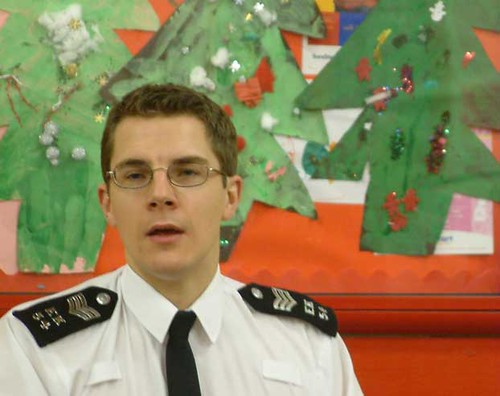Barry Loader of the Metropolitan Police introduced himself to the meeting. He has been a police officer for 13 years, working in Kentish Town for the last 3 years, where he is Sector Sergeant. He has been a cyclist for much longer – 28 years – though these days for leisure only.
Since 1st January 2005, 1,679 bicycles have been reported stolen in Camden (a 5% increase on 2004). Of these, only 67 have been recovered and returned to their owners. It has been reported that 80,000 bikes were stolen in London as a whole last year.
Which bikes get stolen? Those not locked at all, those secured with poor quality locks, those locked up poorly (e.g. to short poles, or with the lock close to the ground) and those targetted by professional thieves.
See Advice on good locks (look under ‘leisure’!). Sgt Loader added that some responsibility had to rest with manufacturers and retailers, both of whom could do more to help reduce the amount of bike theft.

One of the problems the police face is identifying the owners of stolen bicycles when they are recovered. (The police in Camden have retrieved many more than the 67 mentioned above.) Even when thefts are reported, the details owners provide are often inadequate (e.g. don’t know number of gears). Sgt Loader stressed the importance of having a complete and accurate description of one’s bicycle, frame number and all, and, ideally, registering it on Immobilise. Coding is still done, but only at police stations.
When recovered, bicycles usually do resemble the descriptions given of them (provided these are sufficiently precise) – in other words, they don’t tend to have been modified. (Though professional thieves do disassemble expensive bikes.)
Sgt Loader’s Holborn colleages, together with the Design Against Cime unit at Central at Martins have helped design a leaflet advising how best to lock up bikes On Street Bicycle Parking. 10,000 are to be printed and distributed in and around the university area of the southern part of the borough. Sgt Loader promised to get some for us.
The police are building up intelligence information about organized cycle theft, and have used ‘tracker’ bicycles in ‘sting’ operations to trap thieves.
Another initiative Sgt Loader has been involved in is the pavement cycling campaign in Kentish Town. The police undertook two leafletting sessions recently, handing out 25 leaftets on each occasion. Of the fifty or so cyclists encountered, six were found to be on stolen bikes! The police had initially undertaken this campaign just to appease complainants, but now are keen to use it to catch crooks. (CCC had a hand in the Pavement Cycling Leaflet<).
Sgt Loader went on to talk about the use of bicycles by the police force. He would like to see much more of this, but health & safety / risk assessment considerations make it unnecessarily complex and costly. There are currently four bikes each at the Kentish Town and Hampstead police stations.
On a final point, Sgt Loader said that he would be happy to relay road safety concerns which we had to the Council, with whom the police regularly liaise. (He did, controversially, express skepticism about speed cameras.)

Throughout his talk, Sgt Loader had been gracefully taking questions from the floor and the meeting finished with a variety of extra questions, such as: ‘what is the law on riding a bicycle while under the influence?’ (answer: under old vagrancy laws one can be charged with being ‘d;runk in charge of a carriage’); ‘why can’t police car drivers keep their speed down when they’re not on blue light?’ ‘what do you think of bicycle registration?’ (answer: ‘not much’), and so on.
Sgt Loader was then thanked for his very information talk, and the meeting then launched into the traditional seasonal celebrations, with delicious Indian snacks and a variety of liquid refreshments. A good time was had by all!


